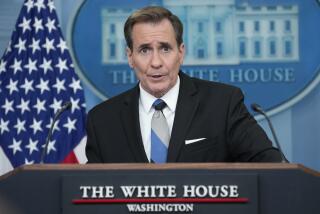U.S. to Ease High-Tech Ban Against Soviets
- Share via
KENNEBUNKPORT, Me — The United States and its major allies have agreed on a plan to cut by half the list of high-technology products--from computers to airliners--that they will block from shipment to the Soviet Union, the White House announced Friday.
The new list reflects the sharp reduction in East-West tensions and the resulting collapse of barriers to trade between the West and the former members of the now-defunct Warsaw Pact, the political and military alliance that Moscow had maintained with other communist countries.
However, despite the relaxation, the Soviets still will be unable to buy some of the most advanced computers and communications equipment that Western nations produce--particularly state-of-the-art fiber-optic systems.
The agreement was negotiated in Paris by the members of the 40-year-old Coordinating Committee for Multilateral Export Controls, known as COCOM, set up to police export controls. The preparation of the new list follows a 16-month review of previous restrictions.
White House Press Secretary Marlin Fitzwater, en route with President Bush for an extended holiday visit here in Maine, hailed the new accord as a significant step toward relaxation of trade restrictions.
“The United States and its partners concluded that an overhaul of the list was justified based on a changing strategic situation and rapid diffusion of some technologies that were making the existing control lists obsolete,” Fitzwater said.
The 50% reduction follows a 33% cut that was made public in January, 1990. While it opens up much wider avenues for trade with Eastern Europe, some business groups raised complaints that it did not go far enough.
Fitzwater said Friday that with the latest reductions intact, the list of restricted goods included only those that were critical to “maintaining the existing significant gaps between Western and Soviet-based military systems” considered critical to national security.
However, he said, the broad spread of certain technologies had already dictated the lifting of nearly all controls on some products, including most of the computers available for export from the United States.
Besides the United States, the 17-country COCOM includes Japan, Australia and all members of the North Atlantic Treaty Organization except Iceland. For more than 40 years it has administered restrictions on exports to the Soviet Union and former Eastern Bloc.
The same 16-month review also resulted in wider access for countries such as Poland, Czechoslovakia and Hungary, which have agreed to strict enforcement procedures to keep sensitive equipment from reaching their former Soviet allies.
The new “core” list, which goes into effect Sept. 1, drops some items that could contribute to the development of nuclear, chemical and biological weapons. But Fitzwater said that COCOM members had pledged to maintain their own controls on such goods.
Among the items that had been blocked from export, but which will now be available for foreign sale, are:
* Most 32-bit microprocessors, all dynamic random access memory chips and semiconductor manufacturing equipment for 1.5-micron integrated circuits.
* All but the strongest carbon and polymer fibers used in structural composites.
* Telecommunications equipment that the White House said would allow the Soviet Union to update its telephone system to a level equivalent to that in the United States in the 1980s. However, the most modern fiber-optic systems, which are less susceptible to the sort of electronic eavesdropping carried out by spy agencies, will still be prohibited from export.
* Most optical sensors used in scientific instrumentation and industrial equipment, as well as scientific and industrial lasers (while controls remain on items useful in building night-vision goggles used by the military).
* Civilian aircraft, including Boeing 747s and 767s.
* Most commercial hydrofoils, as well as some civilian unmanned submersible vessels.
Times staff writer Karen Tumulty in Washington contributed to this article.
More to Read
Sign up for Essential California
The most important California stories and recommendations in your inbox every morning.
You may occasionally receive promotional content from the Los Angeles Times.










